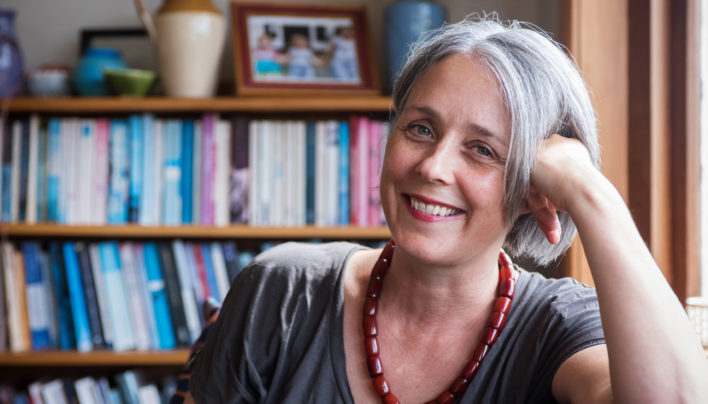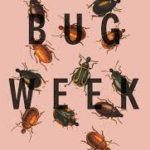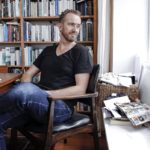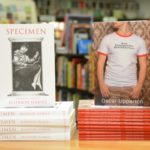Unity Books Wellington spoke to Kate Duignan ahead of her in-store launch for her new book, The New Ships (VUP)
Kate Duignan’s first novel, Breakwater (2001), was published by Victoria University Press. She has published in Landfall and Sport, and has been anthologised in The Penguin Book of Contemporary New Zealand Short Stories (2009) and The Auckland University Press Anthology of New Zealand Literature (2012). Kate received the Louis Johnson New Writer’s Bursary in 2002, and held the Robert Burns Fellowship at Otago University in 2004. Kate lives in the Aro Valley, Wellington, with her partner and children.
WHAT ARE YOU CURRENTLY READING AND HOW DID YOU DISCOVER THE BOOK(S)?
Right now I’m reading Rajorshi Chakraborti’s The Man Who Would Not See. I missed out on Raj’s book launch and I’m excited to finally read this novel set in Karori and Hazaribagh, India. I’m planning to go back and finish Pachinko, by Min Jin Lee, which several of my facebook peeps recommended. I’m considering reading The Sympathizer by Viet Thanh Nguyen after that, but my partner has warned me that I need to steel myself for that experience. One novel I’ve missed out on and want to read is A Girl Is A Half-Formed Thing by Eimear McBride. I also want to read Peter Wells’ Dear Oliver. I have been following Peter’s recent writing on facebook and savouring his rich, nuanced observations of all kinds of things: insomnia, cats, the pleasure of a good cup of tea, drunkenness.
WHO ARE YOUR FAVOURITE WRITERS AND WHAT DO YOU LOVE ABOUT THEM?
Colm Toibin, W.G. Sebald, Marilynne Robinson, J.M. Coetzee, Janet Frame. I love how Toibin and Sebald are full of melancholy without it being at all clear how they are doing that. I love Coetzee for his seriousness, for his restless, self-interrogating doubt of every ethical position. I have only read Frame’s autobiographies, Owls do Cry and Faces in the Water. I love her delight in the world, and her tenderness towards other people’s stupidities and foibles. Her writing never feels angry, or never only angry: I almost can’t understand how that is possible, but she seems to have the trick of side-stepping it to see humour. Marilynne Robinson’s novels are preoccupied with the way that our homes and the shelters we build for ourselves are so temporary and so frail. Housekeeping is the most mysterious and wild of her four novels, and the one I love best.
WHAT BOOKS ARE ON YOUR BEDSIDE TABLE?
All the ones I bought over the past year or two and either never started or never finished. I gave up on a lot of books when I was concentrating on finishing my PhD and novel. It’s not really the book’s fault.
WHAT IS YOUR FAVOURITE BOOK-TO-FILM ADAPTATION?
The Life of Pi: on account of the terrifying tiger and the hyper-beauty, even more fantastical in 3D. Two other films that I reckon do justice to brilliant novels are Never Let Me Go (Kazuo Ishiguro) and The Reader (Bernhard Schlink).
WHAT BOOK HAVE YOU RE-READ THE MOST AND WHY?
Gilead by Marilynne Robinson. I wrote my PhD critical thesis on this novel, and the voice and sayings of Reverend John Ames are now lodged deep, and possibly forever, in my brain.
WHO IS YOUR FAVOURITE LITERARY CHARACTER?
Ah, this is hard. I would like to say Dorothea, or one of those Jane Austen women, but the real truth is I love the characters that live badly, with a pervasive sense of failure and unease. Jack Ames in Gilead is like that. You get to see a lot more of him, and ache a lot more for him, in Robinson’s sequel, Home. A.L. Kennedy’s characters are almost always like this, walking around with painful self-awareness and sardonic humour and I love them for it: Hannah Luckraft, the alcoholic narrator of Paradise for instance. Sasha in Jean Rhys’ Good Morning, Midnight is another. I’m totally drawn to these helplessly self-defeating characters. I should probably read Dostoyevsky.
WHAT BOOK HAVE YOU ALWAYS BEEN MEANING TO READ BUT STILL HAVEN’T GOTTEN AROUND TO?
I have never read anything by Charles Dickens. I have never read Moby Dick. I want to read the last five books of Harry Potter to understand what’s going on in my nine year old’s head.
WHICH THREE WRITERS WOULD YOU HAVE OVER FOR DINNER? WHAT WOULD YOU COOK THEM?
The two writers I most often have over for supper most often are Tim Corballis and Ingrid Horrocks. Generally we have fish and chips while our daughters run around getting dressed up in robes and casting spells. Maybe George Saunders could come and join us one evening. Every time I read or listen to one of Saunders’ interviews I come away feeling calmer and wiser. He seems like a good person in every sense, and I think he would cope with fish and chips. Can I invite Pip Adam and Anna Sanderson too? That would be perfect.
HOW ARE YOUR BOOKS SHELVED AND ORGANISED AT HOME?
My kids view our books as playthings and props so these days there is no system whatsoever. We try to stop the little one eating / ripping / drawing on them. We try to put them back on the shelf with the spines facing out. We try to return all the books we borrow. These are all aspirational statements.
WHAT IS YOUR FAVOURITE LITERARY QUOTE?
“Write a little every day, without hope, without despair” (Isak Dinesen). It took me a long, a really long time to learn that this is the only way (for me) to finish a novel.
(author photo credit: Robert Cross)







